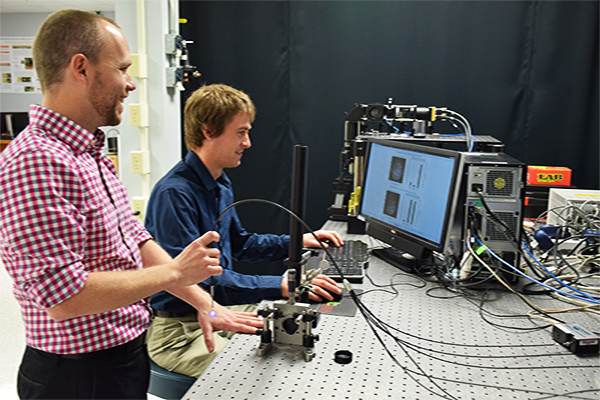
FAYETTEVILLE, Ark. -- Timothy Muldoon, an assistant professor in the Department of Biomedical Engineering at the University of Arkansas, recently received an Academic Research Enhancement Award from the National Cancer Institute. The $442,000 award, which will be distributed over a three year period that began on March 1, will enable him to continue research that will assist in the early detection and prognosis of gastrointestinal cancers by using optical devices which allow clinicians to directly measure tissue during endoscopic procedures.
"Early detection of esophageal adenocarcinoma is a significant diagnostic challenge and current surveillance methods are problematic and limited," said Muldoon.
To help overcome this issue his research will explore the use of microendoscopy or "optical biopsy" techniques, which may be able to help clinicians in localizing regions of early dysplasia at the time of an endoscopy.
Above: Ph.D. student Gage Greening
Above: Ph.D. student Sandra Prieto
In addition to Muldoon, other key personnel on the project include co-investigator Narasimhan Rajaram, and doctoral students Gage Greening and Sandra Prieto, all of the U of A. The research team has already developed a hybrid microendoscope based on high-resolution imaging and spectroscopy, which will be sensitive to functional changes which occur during tumor development. With the funding provided by the award, they will now begin to observe and quantify important optical imaging signatures of the structural and functional changes associated with early cancer in a cross-sectional study of gastrointestinal cancer progression. Muldoon says these observations should yield "a comprehensive, non-invasive imaging method capable of improved early detection of dysplasia, and provide prognostic information and therapeutic guidance," according to Muldoon.
Contacts
Elizabeth DeMeo, media specialist
Biomedical Engineering
479-575-4667,